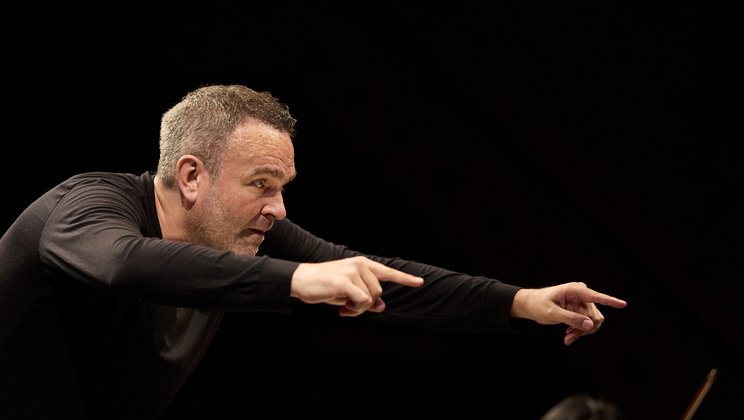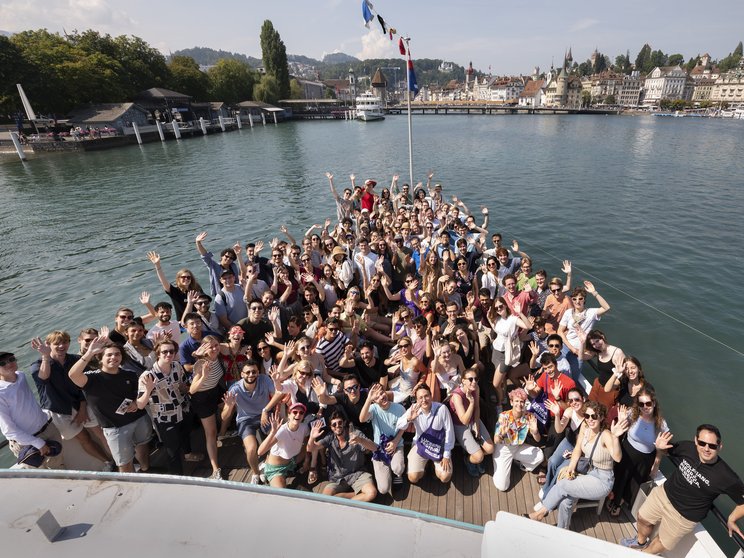The Lucerne Festival Academy is a school for new music and a laboratory for the future. For over 20 years, the Lucerne Festival Academy has enabled around 100 talented young musicians each summer from all over the world to dedicate themselves to the music of our time. They work on a diverse repertoire that ranges from the milestones of the 20th and 21st centuries to brand-new scores.
Learn more“He's like a Swiss Army knife”
Mark Sattler, dramaturg for the Festival’s Contemporary division, in conversation with Jörg Widmann, the designated Artistic Director of the Lucerne Festival Academy, and Sebastian Nordmann, who will become Executive and Artistic Director of Lucerne Festival in 2026
Mark Sattler: Jörg Widmann, what does Lucerne Festival mean to you? You were composer-in-residence in 2009. What memories do you have of that time? Is there a particular concert or highlight that has stayed with you?
Jörg Widmann: For me, Lucerne Festival stands for the combination of the highest artistic excellence with a spirit of curiosity and experimentation. An unforgettable experience for me was a performance of Gustav Mahler’s First Symphony with Claudio Abbado and the Lucerne Festival Orchestra in 2009. I have also watched countless videos of Pierre Boulez’s involvement with the Festival, particularly his groundbreaking performances of compositions from the Second Viennese School with the Academy Orchestra.
Mark Sattler: The Lucerne Festival Academy was founded by Pierre Boulez and Michael Haefliger more than 20 years ago. Wolfgang Rihm took over in 2016. You know both of them well: you worked with Boulez and studied with Wolfgang Rihm, who dedicated many works to you as a clarinetist. What does succeeding Rihm in this role mean for you?
Jörg Widmann: First and foremost, it’s an enormous responsibility. I was closely connected to both, so in that sense there is a wonderful sense of continuity. When Pierre Boulez began his work at Lucerne Festival, he was redressing a lacuna that had persisted for decades in the music world: the lack of structured teaching of 20th-century music, particularly in the context of training young musicians, ensembles, and orchestras. Thanks to his qualities as a conductor and his charismatic personality, this repertoire was brought to life at Lucerne Festival in exemplary interpretations. Wolfgang Rihm, in turn, left a lasting mark through his work mentoring young composers at the Academy. Today, I believe it is more important than ever to build on this legacy to embed contemporary music even more deeply into traditional concert programs and to build bridges between the masterpieces of the past and the music of today. The goal is to make music that is composed today even more visible and a more self-evident part of our musical lives.
Mark Sattler: You are deeply acquainted with the international new music scene – how would you classify the Lucerne Festival Academy? What makes the Lucerne Festival Academy special?
Jörg Widmann: At the Lucerne Festival Academy, performers, composers, and conductors can engage with contemporary music in a very practical way – through workshops, rehearsals, and public concerts – and ultimately bring it to the stage. That combination of depth and scale is truly unique.
Mark Sattler: Presenters of contemporary music often hear the criticism that they should be more open, less elitist. What’s your response to that?
Jörg Widmann: That’s a broader phenomenon that impacts society as a whole: we need to think things through together! Elite-level support should always be tied to broad-based outreach—just as elite sports depend on grassroots sports. If we manage to inspire even more people to engage with contemporary music, that would be a wonderful thing. At our annual Forward Festival each November, we’re trying to do just that—by connecting contemporary music with what I would call contemporary music of earlier centuries: a kind of cross-century contemporaneity.
You can clearly see how excellence at the highest level benefits the wider public when you look at the former young musicians of the Lucerne Festival Contemporary Orchestra. Back when they were laying the groundwork alongside Pierre Boulez, they were just beginning; now many of them are members of leading ensembles and orchestras, passing on their knowledge to the next generation at academies around the world. And this is precisely our goal: to continue bringing the world’s most promising young talents in composition, conducting, and music-making to Lucerne every summer!
Mark Sattler: Tell us about your collaboration with Sebastian Nordmann. What do you value in working with him?
Jörg Widmann: His curiosity and openness. Everything is up for discussion! Both for him, following his successful tenure at the Konzerthaus Berlin, and for me in my own artistic journey, the task in Lucerne is a new and exciting challenge – one we both approach with drive and enthusiasm. Every beginning has its own magic.
Mark Sattler: Sebastian Nordmann, how did you first come to know Jörg Widmann?
Sebastian Nordmann: I first got to know Jörg as a fascinating clarinetist. He has an incredibly wide palette of expressive possibilities and colors. During my years in Berlin as Artistic Director of the Konzerthaus and the Konzerthaus Orchestra, I had the opportunity to invite him to conduct several times – which was not easy, given his busy schedule. At the same time, I experienced several world premieres of his works; I am a great admirer of his music. His residency concerts with the Berliner Philharmoniker moved and inspired me deeply.
Mark Sattler: Is there a particular moment in your collaboration to date that has stayed with you?
Sebastian Nordmann: Absolutely! It was when we met in Berlin and I asked him whether he would like to succeed Wolfgang Rihm as Artistic Director of the Lucerne Festival Academy. It turned into a long evening full of profound conversation and a shared desire to make a meaningful contribution to classical and contemporary music – and to inspire audiences in the process.
Mark Sattler: Why did you choose Jörg Widmann as the Academy’s new Artistic Director?
Sebastian Nordmann: He's like a Swiss Army knife: with Jörg on board, nothing can really go wrong. With his humor, knowledge, and musical gifts, he has a unique ability to captivate musicians and audiences alike, whether the focus is on traditional or contemporary music. His compositions are emblematic of this: they are incredibly intense, densely crafted, often filled with echoes of music history – and sometimes with a wink.
Mark Sattler: What does he bring to the role? Why is he the right person to lead this institution?
Sebastian Nordmann: Jörg not only brings deep experience working with orchestras and audiences, but also a genuine passion for teaching. He has been sharing his extensive knowledge with the next generation for many years. The foundational idea underlying the Academy, as envisioned by Pierre Boulez, was to provide contemporary training in the field of contemporary music. It was very important to him and to Michael Haefliger with the Lucerne Festival Academy to create an institution through which the emerging generation of musicians could develop their their instrumental skills and have the opportunity to work closely with renowned composers like Unsuk Chin, Dieter Ammann, and the given year’s composer-in-residence – as well as with the one-of-a-kind Lucerne Festival Contemporary Orchestra under the baton of some of the world’s leading conductors.
Mark Sattler: What does the Academy need in order to remain successful in the future? How can Jörg Widmann contribute to this?
Sebastian Nordmann: This Academy is truly one-of-a-kind worldwide. The globally renowned KKL Luzern, the enchanting Old Town with Lake Lucerne, the prestigious conductors and soloists, the professional infrastructure, and the many rehearsal and concert opportunities in the realm of contemporary music: all of these things make this Academy so distinctive. Jörg Widmann fits perfectly into the “Boulez-Rihm” lineage and will maintain the Academy’s legacy with care while continuing to evolve it.
The interview was conducted in writing in May 2025.

